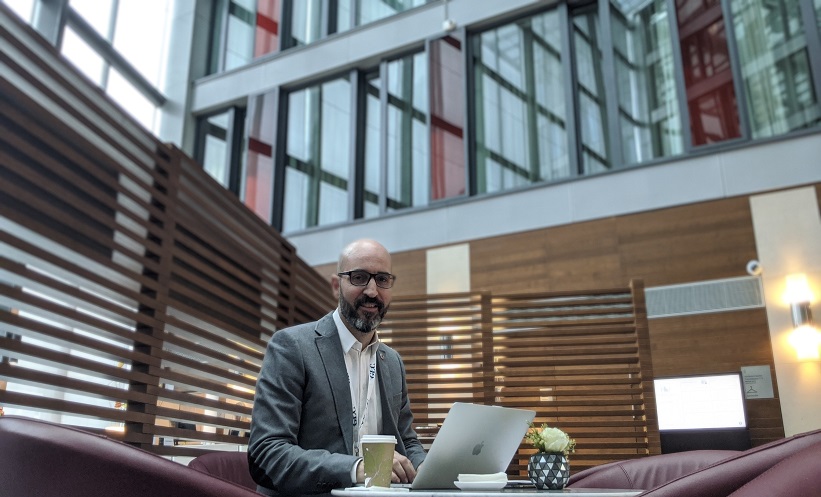Ignacio Quiles Lara, VP and Commercial Director, Spain, Onco-Haematology, GSK
![]()
Interviewed by Kirstie Turner | Content Manager, EMG-Health
![]()
Ignacio Quiles Lara is the VP and Commercial Director, Spain, Onco-Haematology at GSK. We spoke to Ignacio at this year’s virtual eyeforpharma Barcelona event about his transition from research to pharma, the evolving commercial landscape of onco-haematology, and machine learning in oncology.
Q: What was the steepest learning curve when you transitioned from working in research to working for a pharmaceutical company?
A: It’s all about learning curves. A couple of decades ago, I was a biomolecular scientist working for the National Scientific Council. I give thanks every day for that training: never giving up, always asking why, and not taking anything for granted. Mountains are there to be climbed. In research, I had enough time to think about the next trial or theory and bring that knowledge into the future. However, in the pharmaceutical arena, my time is better invested in leading and executing optimal ideas that maximise patient outcomes in real time.
Q: How has the commercial landscape evolved over the past decade in the field of onco-haematology?
A: It’s no secret that the world of onco-haematology has changed over the last decade. Just think about how many new drugs and treatments have been developed. Some cancers were considered untreatable a few decades ago; now they’re highly manageable. You can see that by just looking at the cancer survival rate; more people are surviving every day. The key to this was medical research, but also technology, personalised care and healthcare reforms. This climate spurred on a number of agile players, innovative compounds, complex trials, influencing decision-makers, new biomarkers, niche diseases, healthcare regulations, and, consequently, private resources to bring these solutions to the market. Today, we are on the verge of a new age of cancer care, in which emerging scientific (e.g cancer panomic), technical (e.g. big data), and economic (e.g. quality value) trends are likely to alter our work more significantly in the next 5 years than in the previous decade of modern oncology.
Q: What are the most promising applications of AI in relation to cancer?
A: Cancer is a complex and uncontrollable beast that mutates and changes the goalposts before you even get into the politics and economics surrounding the issue. We are however seeing hope through increased technological advancement in the form of artificial intelligence. Oncology is already benefitting greatly from machine learning (a subset of AI) in areas from diagnosis to treatment, but we’ve barely scratched the surface. We are starting to see a real shift happening, to improve detection and prevent over-treatments with >90% of accuracy. For instance, in lung cancer, cutting-edge machine learning technology is a way to mimic repetitive and easy tasks for the radiologists, in the positive detection and quantification of pulmonary nodules to substantially reduce false positives. However, AI programmes have been developed and applied not only to practices such as diagnosis processes, but also for treatment protocol development, drug development, and personalised medicine, to support operational initiatives, to improve workforce needs, and for patient monitoring, satisfaction, and care.
Q: What types of data are most important when demonstrating to stakeholders the efficacy of new treatments?
A: The evidence necessary to guide policy decisions regarding new treatments overlaps substantially with the evidence necessary to guide everyday clinical decisions for individual patients. Many real-world questions (especially those involving cost, patient-reported outcomes, and the heterogeneity of treatment effects), should drive the practical, real evidence generation regarding new treatments from various key stakeholders. On top of that, new subrogate endpoints (PFS2, MRD, and TTNT) are being discussed, collected, and analysed to open a new range of clinically relevant outcomes. We should move from efficacy-to-effectiveness trial design, in which an effective way to generate and collect data would commence seamlessly upon completion of the efficacy trial. It may improve the evidentiary basis for selecting treatments, expand understanding of the effectiveness of treatments in subgroups possessing particular clinical features, foster incorporation of effectiveness information into regulatory processes, thus furthering improvements in quality metrics and delivering health value. At the same time, many challenges are being learned from the vast amounts of data (lack of national eHealth strategies, technical infrastructures, data access, ownerships, governances, and restrictive policies), which are counteracted by more open information sharing for private stakeholders, and partnerships with academic institutions that allow for greater data access.
Q: How integral is exercising self-discipline in your personal life to becoming a successful leader in your professional life?
A: 99%; the key to success in achieving your goals, both in your professional and personal life, is to become a more self-disciplined person. We shouldn’t sit around and wait until someone tells us what to do; we should just do it. To possess self-discipline is to be able to make decisions, take actions, and execute your game plan regardless of the obstacles, discomfort, or difficulties, that may come your way. Failure is always part of succeeding! Triathlon was my way to enhance self-discipline; I train, set goals, focus my mental and emotional energy, become physically fit, and get along well with others. The triathlon made me strong and decisive. It taught me how to overcome difficulties in everyday life, helping me to regain my confidence and belief in my abilities. It transformed me into a calm and unshakable person, teaching me discipline and endurance. I learnt that even the smallest steps help in bringing us closer to our goal, just like how every step in a triathlon counts. You need to plan ahead in order to truly succeed; if we are to be masters of our own destiny, we must develop self-discipline and self-control. Ultimately our health and happiness depend on it.








